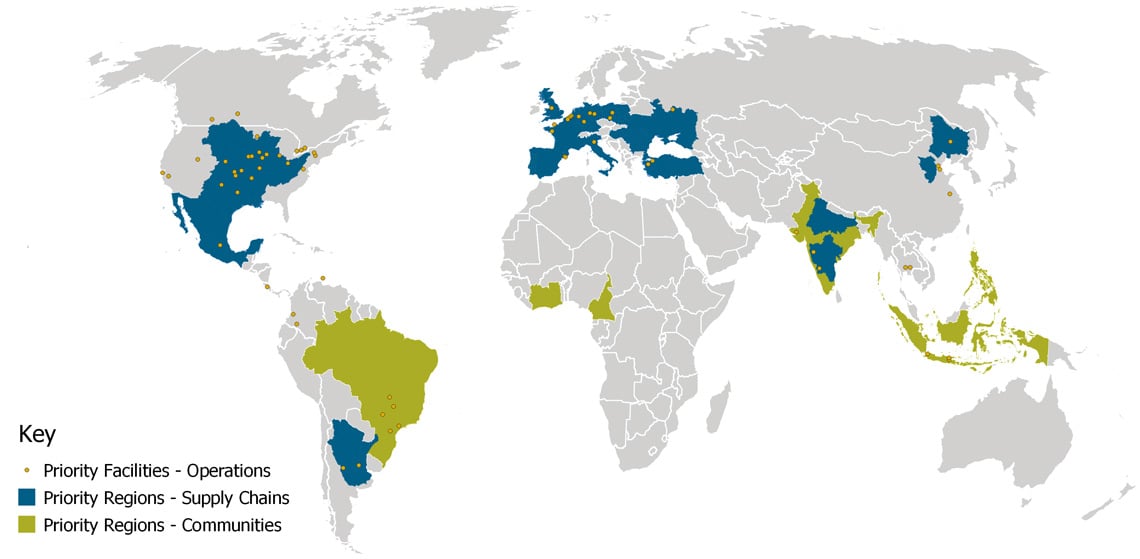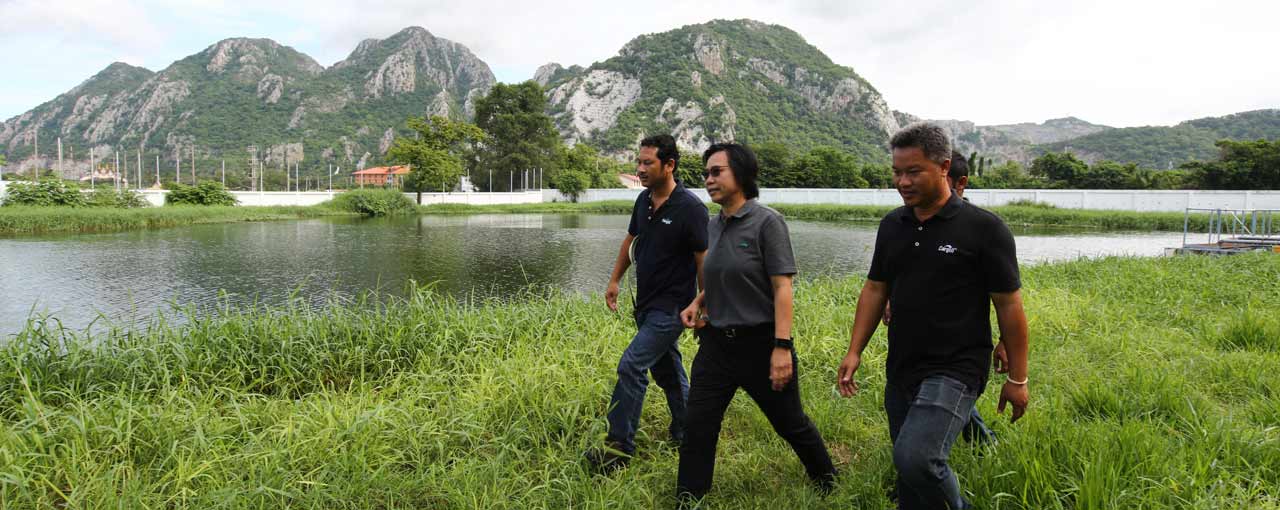Water
Enabling a water positive impact in our operations, supply chains and communities
Clean water is essential for people and agriculture. With about 70% of annual freshwater used to produce the food we eat, the public and private sector must partner to produce more food sustainably to meet the demands of a growing global population.
For that reason, Cargill, along with the farmers, customers, and NGOs we work with, plays a vital leadership role in developing and scaling agricultural solutions that protect and conserve water resources.
In doing so, we prioritize solutions that deliver multiple benefits, including addressing climate change, improving farmer livelihoods, and supporting women’s empowerment – helping us build more sustainable and resilient supply chains.
While water conservation is a global issue, it requires a local approach – and that drives us to focus our efforts on the supply chains and regions where it’s needed most. Together, we are driving positive changes in water usage in our operations, in the communities where we live and work, and in the supply chains where our farmers grow the food that feeds the world.
Prioritizing action where it's needed most
We are focusing our efforts on improving water availability, quality, and access in the supply chains and regions where we can drive the greatest positive change.
Water is a complex global issue that requires a local approach. Water challenges and issues vary across the regions where we operate and source raw materials. From having too much water, to not enough water, to poor water quality and access, taking a local approach allows us to address the specific needs of that region.
Within our facilities, across our supply chains and in our communities, we focus our efforts on improving water availability, quality, and access based on the local water challenges.
Our commitments
Our global ambition is to enable a water positive impact across our operations, supply chains, and communities by 2030. We define a water positive impact as improving watershed health by addressing the shared water challenges of availability, quality, and access to safe drinking water, sanitation, and hygiene (WASH).
Our targets are grounded in the best available science and methods; they catalyze action where it is needed most based on the local water challenges in these watersheds.
By 2030, Cargill will:
- Operations: Implement water stewardship practices at all 72* priority facilities.
- Supply Chains: Enable restoration of 600 billion liters of water and reduction of 5,000 metric tons of water pollutants in water-stressed regions
- Communities: Enable improved access to safe drinking water and sanitation, reaching 500,000 people in priority communities
These targets were developed following a data-driven, risk-based approach, in close partnership with the World Resources Institute (WRI). They prioritize action where it is needed most, based on the specific challenges faced by our local businesses, communities, and the surrounding region. Our approach also considers our ability to drive change, connecting Cargill’s footprint and those of relevant stakeholders in the value chain.
Learn more about the process we took with WRI to set our targets, or read the case study published by WRI: ‘Developing Enterprise Water Targets Informed by Local Contexts: Cargill’s Approach.’
*Please note that the number of priority facilities may change over time due to acquisitions, divestitures, or major changes to our operations. We have currently identified 72 priority facilities based on water stress and water usage. Together they account for more than 80% of our total operational water use.
Cargill Priority Water Facilities and Regions

Cargill’s Actions
Advancing sustainable water use in our operations
For our facilities, we commit to practicing good water management by reducing our own footprint and working with others in the watersheds where we operate.
Within our operations, Cargill has implemented a set of global requirements that address our commitment to enabling a water positive impact by reducing our own footprint, meeting compliance requirements, and understanding and reporting of water usage, impact, and risk.
Our priority facilities account for more than 80% of our total operational water use and were selected based on water stress exposure and water usage. Each of these facilities have set site-specific targets for water efficiency and yield-loss reduction through wastewater. They have focused on measuring and monitoring water use and discharge in their operations to better understand their water dependency and impact.
Additionally, they have developed water balances, benchmarked water usage, and completed site risk assessments to more clearly identify shared water challenges in their local context.
This information and context are critical to help us move into full implementation of our water stewardship program at all priority facilities by 2025.
Agriculture is how we'll ensure reliable water sources in our supply chains
By 2030, we will enable the restoration of 600 billion liters of water and reduction of 5,000 metric tons of water pollutants in water-stressed regions.
Through collective action and engaging in our supply chains, agriculture can be part of the solution to improving water quality and availability for future generations, while supporting farmer livelihoods and community resilience.
We work with farmers, ranchers and other partners across our value chain to develop and scale agricultural solutions, such as regenerative agriculture, that improve soil health, climate and water resiliency, and water quality. Many of those solutions also reduce greenhouse gas (GHG) emissions and improve farmer livelihoods.
We also work to protect and restore grasslands and aquatic habitats in critical geographies of our supply chains, and partner with leading conservation organizations to invest in programs that improve water quality and protect biodiversity.
Our priority supply chains and geographies include beef production and row crops in the U.S., Mexico, Europe, and parts of India and China. We’re applying learnings from our work and scaling them across these businesses to drive greater impact.
Promoting access to clean water in our communities
Our goal is to enable improved access to safe drinking water and sanitation, reaching 500,000 people in priority communities
Reliable access to clean, safe water as well as sanitation and hygiene are essential for communities to thrive. While access to water and sanitation is improving globally, there are still parts of the world where limited access to safe drinking water is a local challenge.
Cargill is working to drive positive change, tailoring the specific needs of target communities in priority regions around the world. In partnership with global NGOs like CARE and Global Water Challenge, we’re working to enable improved access to safe drinking water and sanitation for 500,000 people.
News Highlights
We’re partnering with the Soil Health Institute to advance water stewardship
Sep. 14, 2023
Cargill and the Soil Health Institute are working together for our farmers. The partnership will equip farmers and partners with innovative tools to enhance drought resilience, improve soil health and encourage sustainable water usage across North America.
5 reasons why clean water is important
Did you know that more than 2 billion people lack access to safely managed drinking water? Here’s why that matters for everyone.
Read Time: 5 minutes
Ripple effects: Connecting farmers and communities with safe, clean water
Water access is a challenge for thousands of rural farmers and agricultural communities around the world
Read Time: 4 minutes

